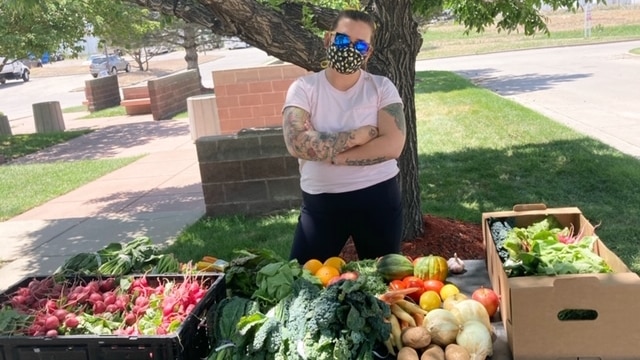Colorado woman donates and sells boxes of repurposed restaurant produce

Eames knew just the right person to call: Alexandra LittleJohn.
The LittleJohn Produce Box Project creates boxes of food every week from products at various Denver suppliers. LittleJohn sells some boxes but also donates hundreds to those in need, including students at Valverde, a Title 1 school.
That family from Valverde received two boxes shortly after calling Eames. They are just one example of the many Colorado residents who have benefited from the project, which started in April and also aims to assist struggling restaurant employees.
“People who work in the food industry aren’t out to make a ton of money,” said LittleJohn, 36. “They’re out to serve people. True hospitality is meeting people’s needs before they know they need them. That’s something I’m very passionate about.”
When the pandemic hit Colorado in mid-March, LittleJohn learned Fresh Guys Produce, a supplier in Denver, sold boxes of fresh vegetables and fruits. LittleJohn, working as a barista at OZO Coffee in Boulder, picked up Fresh Guys’s boxes for herself and co-workers.
Those trips halted in April when LittleJohn said she was laid off.
A few weeks later, though, an idea popped into her head. She still had connections with Fresh Guys employees, and she knew there were other locals who were struggling to buy food during the pandemic (LittleJohn said she had once been on Special Supplemental Nutrition Program for Women, Infants and Children). She wanted to meet that need.
“If you’re humble enough to ask for food,” LittleJohn said, “you can have food.”
She started buying food boxes from Fresh Guys for $20 and donating them. The boxes include products such as collard greens, radishes, artichokes, beats, corn, oranges, zucchini, apples, onions, eggs and potatoes. Because she understood the downside of working in the food and beverage industry, LittleJohn aimed to provide food to others in her field who were laid off, furloughed or lost hours.
Philip Steed, for example, said he worked only about 10 hours per week for minimum wage at OZO Coffee as the business retooled during the pandemic. While still paying rent for his apartment in Boulder, the 20-year-old struggled to produce the income for food. So, he started receiving one box per week, which has continued.
“It was awesome and inspiring to receive a box from her,” Steed said, “because she was just taking her bad situation to help other people in need.”
As LittleJohn advertised her project on social media, her former co-workers donated money, and other local food suppliers, Oatly and Torani, provided oat milk and coffee syrup, respectively, for the boxes.
At first, LittleJohn aimed to sell enough boxes to pay her bills. But soon she was expanding her business, setting up weekly pickup locations around Denver and Boulder, delivering boxes to customers’ homes and attending farmers markets, where she’ll often sell the boxes for $25. LittleJohn said most of the profits go toward buying more boxes to donate, expenses for delivery and other essentials. In June, she donated all of the project’s profits to Black Lives Matter organizations after George Floyd’s death in police custody.
Another of her initiatives is to keep people out of grocery stores to help prevent the spread of the coronavirus. That was especially crucial for Denver resident Tara McLauchlan, whose roommate in March was at high-risk for the virus. McLauchlan didn’t want to risk exposing herself to the coronavirus at grocery stores, so she relied on LittleJohn’s delivery and pickups. The option of donating boxes has also intrigued McLauchlan.
“Covid, at least for me and some of my friends who have been lucky enough to maintain our jobs, there’s been kind of this weird stuck point where I can donate money. … But how do I volunteer, especially when there is a concern of the virus?” the 33-year-old said. “This has been another way to help.”
LittleJohn’s project has also benefited local food suppliers, because many of the restaurants they provided for shut down or are open on limited hours. Fresh Guys closed after an employee contracted the coronavirus about two weeks ago, but LittleJohn has continued to receive its produce to fill her boxes. Otherwise, the food would go to waste.
LittleJohn said she has sold more than 1,300 boxes and donated more than 460 boxes. She hopes this is just the beginning of a flourishing nonprofit.
The longer the business stays afloat, the more families will be fed. That keeps LittleJohn motivated.
“It’s really eye-opening that there’s such a need,” Eames said. “You don’t really think about it or take it for granted. Like, ‘Oh, it’s just a few potatoes.’ When you’re a family and you’ve taken on another family and you don’t have income, it’s a big deal.”






